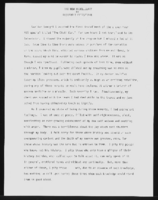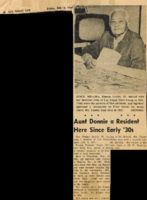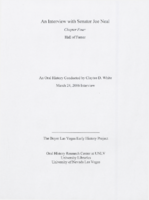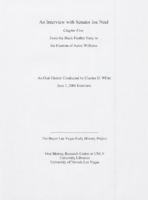Search the Special Collections and Archives Portal
Search Results

Transcript of interview with Dedee (DaVeen) Nave by Claytee D. White, June 8, 2015
Date
Archival Collection
Description
Dedee (DaVeen) Nave reveals a life filled with distinguished results in the cultural evolution of Las Vegas since her move to the valley in 1971. She was a young bride and soon a mother when she arrived with her can-do energies. She was a trained educator who was eagerly looked outside the classroom for a way to make a difference in the community when she took a position with the Camp Fire Girls Over the following decades, the impact of involving Dedee in many valued projects is evident. In this interview, she provides a glimpse into her various aptitudes and the many people she has worked with to great results. Dedee Nave was born DaVeen Maurer in 1948 in Indianapolis, Indiana, to David and Virginia Maurer and has a sister, Marilyn Maurer MacCollum. Their mother was a convert to Judaism who instilled them with a solid Judeo-Christian foundation. When Dedee became the bride of a mixed marriage, she raised her daughter Alisa in the Jewish faith. Alisa, who is married to Robb Worth, is a practicing attorney in Las Vegas. A graduate of Stephens College in Columbia, Missouri, Dedee studied fine arts, considered being a theater major, modified her plans and became a skilled organizer of people and projects. This ability to envision, implement, and fundraise is seen in Dedee?s distinguished list of community programs, among them her work with: the City of Las Vegas Arts Commission; two terms on the Nevada State Arts Council; a past president of the Junior League of Las Vegas; former chairperson of the Junior League?s Endowment Fund Trustees; Lied Discovery Children?s Museum opening; and chairperson of Morelli House Public Program and many other initiatives.
Text

"The New Huckleberry": article draft by Roosevelt Fitzgerald
Date
Archival Collection
Description
From the Roosevelt Fitzgerald Professional Papers (MS-01082) -- Drafts for the Las Vegas Sentinel Voice file. On PBS' "The Civil War" Documentary and Black history.
Text

Newspaper article, Aunt Donnie a Resident Here Since Early '30s, Las Vegas Sun, February 12, 1965
Date
Archival Collection
Description
Newspaper article featuring Donnie Ensley. "Aunt Donnie" Ensley was 84 at the time the article was written and came to Las Vegas in 1931. She and her husband, Jake, operated a cafe on First St.
Text

Newspaper clipping, NAACP Bachelor of the Year Fund Raising Affair, publication unknown, April 29, 1976
Date
Archival Collection
Description
Newspaper clipping with photograph featuring Toni Miller from Western Airlines buying an advertisement from NAACP representatives Saran Knight, Eleanor Walker and Lubertha Johnson.
Text
T-Shirt Color: Black; Front: John Graham 22nd Annual Memorial Vancouver Handball Tournament, Emblem W/ Hand& Ball; Back: FDNY Not Forgotten New York City 9-11-01, WTC Flag Raising, approximately 2001-2012
Level of Description
Archival Collection
Collection Name: New York-New York Hotel and Casino 9-11 Heroes Tribute Collection
Box/Folder: Box 448
Archival Component
Stablein, N. K., 1997, "Information On Naval Spent Fuel Request," letter to R. Guida, (Naval Nuclear Propulsion Program, U.S. Department of the Navy), August 22, Office of Nuclear Material Safety and Safeguards, U.S. Nuclear Regulatory Commission, Washington, D.C., 1997
Level of Description
Archival Collection
Collection Name: Environmental Radiation Protection Standards for Yucca Mountain, Nevada
Box/Folder: Box 21
Archival Component
Audio clip from interview with Rabbi Sanford Akselrad, October 29, 2014
Date
Archival Collection
Description
Rabbi Sanford Akselrad discusses Project Ezra, an employment program he established during the recession in conjunction with the Jewish Family Service Agency.
Sound

Transcript of interview with Shelley Berkley by Barbara Tabach, February 13, 2015
Date
Archival Collection
Description
In this interview, Berkley shares her family history, from her great-grandparents? immigration to the United States to her immediate family?s own migration from New York to Las Vegas. She reflects upon her childhood experience in Las Vegas, including her varied leadership positions with Jewish organizations as well as at school, from junior high school through college. Berkley also talks about her involvement as an adult within the Jewish community and more broadly as a public servant, in all levels of government.
Former United States Democratic Congresswoman Shelley Berkley represented Nevada?s 1st Congressional District from 1999 to 2013, an area that includes most of Las Vegas. During her seven terms as a member of the U.S. House of Representatives, the district benefited from millions of dollars of federal funding for education, transportation, and other projects. She also successfully fought against storing nuclear waste at Yucca Mountain in Nevada. Shelley Berkley was born Rochelle Levine in New York City in 1951 and moved to Las Vegas during junior high in 1963. She practiced law in Las Vegas and served in the Nevada Assembly for two years. She was also a member and vice chair of the Nevada University and Community College System Board of Regents. Berkley attended the University of Nevada, Las Vegas where she served as student body president and graduated with honors in 1972 with a B.A. in political science. After obtaining her J.D. in 1976 from the University of San Diego, she returned to Las Vegas to practice law. From 1976 to 1979 Berkley was Deputy Director of the Nevada State Department of Commerce. She provided legal counsel to several casinos at various points in her career, served as national director of the American Hotel-Motel Association, and founded the Southern Nevada Association of Women Attorneys and the Senior Law Project. In 1977 she married Frederic Berkley and had two children, Max and Sam. She remarried in 1999 to Dr. Lawrence Lehrner of Las Vegas, who also had two children from a previous marriage. Before being elected to Congress, Berkley served on the board of the American Israel Public Affairs Committee. She continued her vocal support of Israel in Congress and was heavily involved in all matters related to the Middle East. She was a member of several committees, including: Foreign Affairs, Veterans Affairs, Ways and Means, Small Business, and Transportation. Building a new Veterans Administration medical complex in Southern Nevada and sponsoring many pieces of healthcare legislation are also among her accomplishments as a U.S. Representative. In 2013, she was appointed CEO and Senior Provost of the Touro College and University System?s Western Division.
Text

Transcript of fourth interview with Senator Joe Neal by Claytee D. White, March 24, 2006
Date
Archival Collection
Description
Fourth interview in a series of five with Nevada State Senator Joe Neal conducted by Claytee D. White on March 24, 2006. Born in Mounds, Louisiana, in 1935, Neal joined his family in Las Vegas as a young man shortly before serving in the United States Air Force from 1954 to 1958. Following his military service, he earned a bachelor's degree in political science at Southern University in Baton Rouge, Louisiana. Neal continued his education at the Institute of Applied Science in Chicago, Illinois, with postgraduate work in law. From 1973 to 2001, he served in the Nevada Legislature as the Senator from Clark County Senatorial District No. 4. In the fourth interview, Neal shares opinions on capital punishment, southern Nevada utility ownership, the ethics and political influence of the gaming industry, high hospital costs, and the bailout of the Economic Opportunity Board, among other issues. He comments on his induction into the Nevada State Senate Hall of Fame and reviews changes in Las Vegas over the years, particularly in education. Neal closes with thoughts on the future of downtown Las Vegas and the potential impact of planned renovations and high-rise buildings on the Westside.
Text

Transcript of fifth interview with Senator Joe Neal by Claytee D. White, June 1, 2006
Date
Archival Collection
Description
Fifth interview in a series of five with Nevada State Senator Joe Neal conducted by Claytee D. White on June 1, 2006. Born in Mounds, Louisiana, in 1935, Neal joined his family in Las Vegas as a young man shortly before serving in the United States Air Force from 1954 to 1958. Following his military service, he earned a bachelor's degree in political science at Southern University in Baton Rouge, Louisiana. Neal continued his education at the Institute of Applied Science in Chicago, Illinois, with postgraduate work in law. From 1973 to 2001, he served in the Nevada Legislature as the Senator from Clark County Senatorial District No. 4. In the fifth interview, Neal recalls the rise of the Black Panther Party and the atmosphere of fear when Patty Hearst was kidnapped by the Symbionese Liberation Army. In closing, Neal relates that voting machines were impounded to protect votes for Aaron Williams, the first black elected to the city council of North Las Vegas, and shares memories of Judge Mendoza.
Text
